WPP: a global company
We directly employ 134,000 people. When our associate companies are included (those in which we have a minority stake) the figure is almost 200,000 people in over 3,000 offices in 112 countries. We believe a diverse workforce is more collaborative, creative and effective and we aim to achieve gender balance in our workforce at all levels. We invest in our people’s skills through training and development and provide paid internships and apprenticeships to bring young people into our industry.
Here we show data in our mature markets as well as some of the world’s growth markets.*
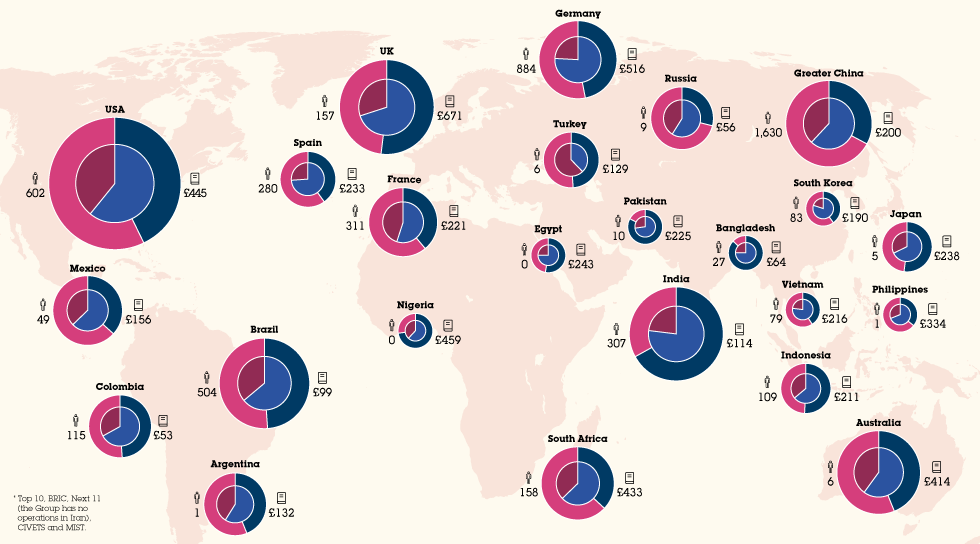
- Male executives
- Female executives
- Paid apprenticeships and internships
- Training spend per person
Diversity and inclusion
A diverse workforce is more collaborative, creative and effective. Research shows that companies in the top quartile for gender or racial and ethnic diversity are 35% more likely to have greater financial returns than the industry average1. Diversity of outlook and background is particularly important for our sector because our work needs to connect with a very diverse and global consumer base. Clients increasingly expect us to put forward diverse teams in both pitches and ongoing work.
We promote inclusive working practices and support our companies to increase the diversity of our workforce through recruitment, policy development, training, mentoring and flexible working practices.
All our people undertake awareness training on diversity as part of our online ethics training ‘How we Behave’, see below. We are also developing e-learning to help our people understand, identify and address unconscious bias. This will be included in our ‘How we behave’ ethics training in 2017 and will be mandatory for all our people. Our UK companies are encouraged to launch their own diversity and inclusion training during 2017 in addition to Group training. We have identified a number of preferred training partners to help them do this.
Sir Martin Sorrell, our chief executive, signed the 4As diversity and inclusion pledge in the US, signalling our commitment to diversity and to working with others to advance minorities and promote diversity and inclusion in the workplace.

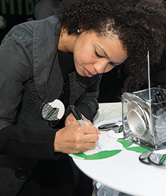
Brave Your Bias for a truly inclusive workplace
Research has shown that despite our best intentions, individuals inadvertently allow their unconscious biases – or assumptions – to influence their actions and behaviours in ways that can stifle diversity. To create a truly inclusive and diverse workplace, we must be brave enough to acknowledge our biases and their impact on our decision-making.
MEC launched Brave Your Bias at New York’s Advertising Week in September 2016. This industry-wide initiative aims to celebrate difference and raise awareness of unconscious bias. Delegates were invited to a Brave Your Bias challenge where they could take the Harvard Implicit Association Test (IAT), that identifies personal bias and sign a pledge to explore the impact unconscious biases have on their decision-making and behaviour. MEC also asked its 800-plus employees in North America to complete the IAT test.
Brave Your Bias has now launched at MEC London with an event at London Ad Week and will be rolled out to other offices in the network. MEC has launched
a social media campaign and Facebook Chatbot that invites users to talk about unconscious bias and receive tips for identifying and addressing their own biases.
Read more and get involved at braveyourbias.com
Gender balance
Achieving gender balance at all levels of our workforce is essential to enable us to attract the best talent – more than half of all graduates in our key markets are women – and create work that connects with female consumers.
Our overall workforce is gender balanced; however, women remain under-represented at the highest levels of the business. As at 31 December 2016, women comprised 29% of the WPP Board, 33% of non-executive directors on the WPP Board, 34% of directors and executive leaders in our operating companies, 48% of senior managers, 54% of total employees and 39% of Global Client Leaders.
The WPP Stella women’s network aims to address barriers that could prevent women progressing their careers
to senior levels within the Group and to facilitate the sharing of good practices between our companies. The network began in the UK and will be extended to our businesses in the US and Asia. As well as supporting our work on inclusion and tackling unconscious bias, the network focused on a number of other initiatives during 2016 including:
- Our Family Friendly Guidelines and Parent Portal for UK operating companies, see Flexible working and support for working parents. Similar guidelines are being developed for the US.
- Training and development, including progression coaching and media training to facilitate women in leadership roles to take up speaking opportunities. A Stella Speakers’ Bureau will be launched during 2017.
- A series of networking events, talks and Q&A sessions for Stella members during the year.
We run ‘The X Factor’, a mentoring and development program for WPP’s senior women leaders. Led by Charlotte Beers, the former global CEO of Ogilvy & Mather and chairman of J. Walter Thompson, this program prepares participants for the next level of executive leadership. A further 12 senior women completed the course in 2016, bringing the total to 109.
Charlotte Beers also helped to inspire ‘WILL: Women in Leadership Lessons’ – a growing collection of programs targeted at enhancing the professional development of the Group’s high potential women. WILL programs have run in three countries, with 239 women leaders from 71 WPP companies attending to date. Our first WILL session in Asia ran during 2016 with a three-day workshop for 25 high potential and mid-career women from several of our companies and markets. Charlotte Beers has also led programs for our client Unilever and will host a program for Kantar during 2017.
We are part of the UK Creative Equals program which supports the objective of getting more women into creative departments.
Gender diversity 2012-2016
Gender 2012-2016
| % women |
2016 |
2015 |
2014 |
2013 |
2012 |
| WPP Board |
29% |
29% |
24% |
29% |
19% |
| Executive leaders |
34% |
33% |
31% |
32% |
32% |
| Senior managers |
48% |
47% |
46% |
47% |
47% |
| Total employees (full-time equivalent) |
54% |
54% |
54% |
54% |
54% |
Walking the Talk at Maxus
Walk the Talk is an intensive coaching experience, available to senior women at Maxus Global. It aims to lead a change in gender equality in the advertising industry by exploring the barriers that women face, both in business and in their personal lives, and giving participants the chance to focus on their ambitions.
The bespoke program helps give women the confidence they need to take steps towards their ‘bigger game’ and to reach the top – ensuring that Maxus leadership is balanced and reflective of the wider
world around us.
More than 800 women have completed the course and 22 secured promotions within eight months. We are sharing the success of the program with other WPP companies and two have launched their own Walk the Talk initiatives. WPP plans to implement the program for 60 senior women during 2017.
Executive leaders* in 2016 by region
(% women)
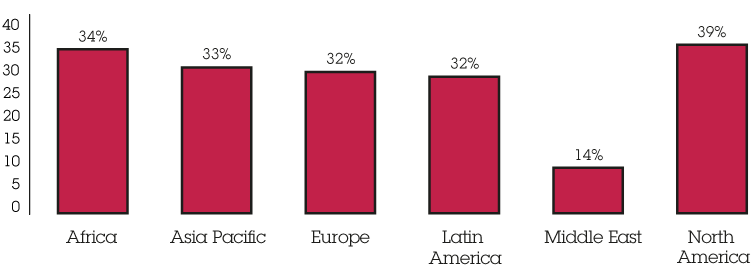
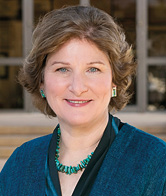
Karen Hughes
Worldwide
vice chair,
Burson-Marsteller
Working with clients on diversity
Burson-Marsteller, a WPP communications and public relations firm, has launched a new offering to help clients take full advantage of the benefits associated with closing the gender gap and creating more opportunities for women to rise as leaders.
Burson-Marsteller Advantage Women brings together communications services with research and insights to develop campaigns that reach women audiences as consumers, decision-makers and influencers.
“Burson-Marsteller Advantage Women is a response to clients and prospects that recognize the business and social benefits
of greater diversity and want internal and external programs to better galvanize the power of women leaders and consumers.”
Flexible working and support for working parents
Flexible working practices help create an inclusive culture, particularly for working parents and people with caring responsibilities, and can help us to retain valued people.
Flexible working arrangements are agreed by our operating companies and can include part-time arrangements, flexible start and finish times, home working arrangements as well as career breaks and sabbaticals. Around 21% of our people have flexible working arrangements, 65% of flexible working requests are approved by our companies and 46% of our companies offer career breaks and sabbaticals.
We launched our Family Friendly Guidelines and Parent Portal for UK operating companies during 2016, following an extensive benchmarking exercise. These are helping our UK companies to implement best practice maternity, paternity and flexible working policies and support working parents. The Parent Portal is an online hub of guidance and support for working parents and line managers, on topics such as maternity, paternity or adoption leave, through to longer-term career management for working parents.
We are starting to track return rates after maternity leave, as this is a stage at which we risk losing women.
Our data, which covers 51% of our companies, shows that 92% of women return to work after maternity
leave including 24% who return part-time. Half of our companies (49%) offer parental leave benefits that
exceed local legal requirements and we aim to increase this. Our companies also offer pre- and post-maternity catch-ups which can enhance retention.
Women returning to work after maternity leave
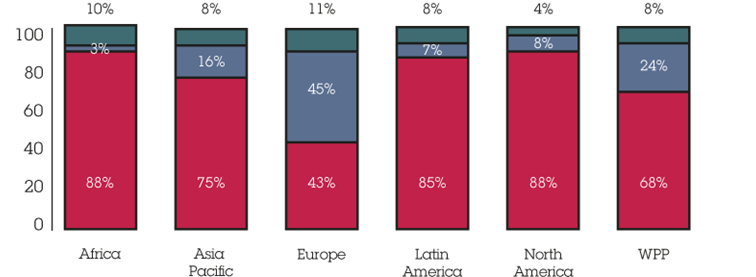
- Returning full-time
- Returning part-time
- Not returning
Support offered to parents returning to work after parental leave
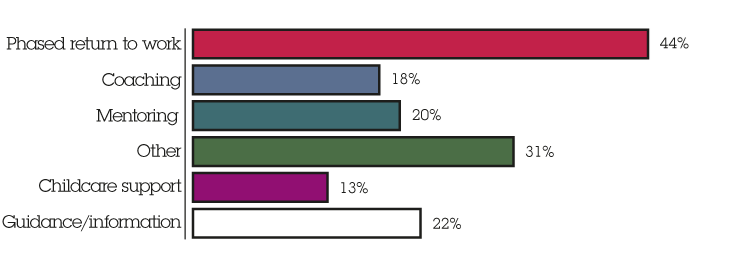
Ethnic diversity
We measure ethnic diversity in our businesses in the UK and the US using national definitions of ethnic/racial minorities (the Equality and Human Rights Commission in the UK and the Equal Opportunity Commission in the US). In 2016, 28% of our people in these countries were from ethnic minorities (2015: 26%).
We were ranked 10th in the FTSE 100 by Sir John Parker’s Report into the Ethnic Diversity of UK Boards published in November 2016, with 3 out of 14 directors considered diverse.
Ethnic minorities (UK and US)
%
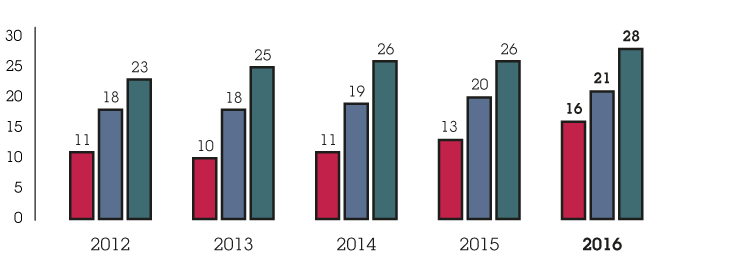
- Executive leaders
- Senior managers
- All employees
Our companies are working to increase the recruitment, retention and promotion of ethnically diverse candidates and employees. Examples include:
- Internships and apprenticeships: Many of our programs target diverse candidates, see Education, internships and apprenticeships. Our companies also support external programs such as PRCA’s PR Internships For All in the UK and, in the US, Ladders for Leaders, The Marcus Graham Project’s summer bootcamp and the 4A’s Multicultural Advertising Intern Program (MAIP). At a Group level we established the Micro Fellowship for students from ethnic minority backgrounds.
- Recruitment: We partner with recruiters and organisations targeting diverse candidates. In the UK, for example, our companies work with organisations such as Rare Recruitment, the job site Milkround, ACS in the City – a diversity recruitment program, City Gateway, Equality Britain, African Caribbean Diversity, Asians in the Media and the Diversity Group that provide access to a diverse pool of candidates. Partners in the US include the One Club, Emma Bowen and LAGRANT Foundations.
- Careers events and higher education partnerships: Our companies attend career fairs targeting diverse candidates and work with colleges that have a more diverse student base such as the Historically Black Colleges and Universities in the US.
- Professional networks: Employee networks and resource groups can assist in attracting and retaining diverse talent.
Nationalities and local recruitment
We are proud of our multinational workforce. There are seven nationalities currently represented on the WPP Board. We estimate that globally 63% of senior managers were recruited from the local country or region in which they work.
Our companies seek to maximise the benefit of our global diversity. For example, the Maxus Global Exchange enables Maxus people to experience another culture, ways of working and forge strong relationships through placements at Maxus offices in other countries. In 2016, 75 Maxus people from 45 countries took part. At VML, offices in different countries pair up and celebrate a holiday or cultural tradition from another location.
Age diversity
A mix of ages can be beneficial to creativity and insight in the workplace. As the global population ages it will also be increasingly important that our companies create work that appeals to older generations.
Our industry has traditionally employed a young workforce, but our data suggests that the proportion of workers aged between 40 and 59 is increasing over time. Around 23% of WPP companies have introduced measures to support recruitment and retention of older people.
Age diversity in 2016 %
- 19 or under 0%
- 20-29 36%
- 30-39 37%
- 40-49 18%
- 50-59 7%
- 60 and over 2%
Age diversity by region 2016 %
- 19 or under
- 20-29
- 30-39
- 40-49
- 50-59
- 60 and over
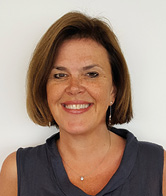
Clare Alger
People and culture director, MEC UK
Where do all the over 50s go?
MEC UK teamed up with industry magazine Campaign to highlight the need for greater age diversity in the media and advertising sector.
The starting point was a survey of more than 200 people of all ages working in the sector. This found that 66% of respondents want to see better representation of the over 50s age category both in the workplace and in advertising. The survey also revealed that a large majority, 79% of those surveyed, feel the industry is ageist.
MEC hosted an Age Debate to share the results, where industry leaders, lawyers, representatives from ad industry charity NABs, clients, and the IPA, discussed the findings.
The company is exploring how it can boost age diversity in its own workforce, and as a starting point has removed the maximum age limit for its apprenticeships. Age is one of the themes explored in its Brave Your Bias initiative, see Diversity and inclusion.
“A shift in attitudes, behaviours, policies and practices around older workers is needed and needed fast within our industry and I’m delighted that MEC is leading the way to ensure we attract, develop and retain this group of diverse talent and to better celebrate the valued role they play in the workplace.”
LGBT diversity
We aim to create an inclusive environment that encourages the recruitment, retention and development of talented people from the lesbian, gay, bisexual and transgender (LGBT) communities.
Our companies take a number of approaches including: attending, sponsoring and hosting LGBT-related events; attending careers fairs targeting LGBT candidates; establishing LGBT employee resource networks (such as Global Team Blue Pride, Grey Pride, Ogilvy Pride and PrideM); and working with external partners such as the PRCA LGBT Group, Stonewall and Reaching Out MBA, a US organisation for LGBT MBA students.
Sir Martin Sorrell was a keynote speaker on the business and economic case for LGBT inclusion at The Economist’s Pride & Prejudice conference held in March 2016 in Hong Kong, London and New York.
Gender transition
Gender transition, when a transgender person makes the decision to publicly change his or her gender, can be
a challenging time for the individual. Our companies need to be able to provide the right support to people undergoing gender transition and their colleagues. We have issued guidelines to our heads of human resources
in all WPP companies globally on how to manage gender transition in the workplace. These include information on how to address concerns and misconceptions as well as practical steps the company may need to take.
Disability
Disability and physical or mental ill-health can affect anyone during their working life. We aim to be a ‘disability smart’ employer, providing the right support and removing barriers so people affected by disability can play a full role in our companies.
In France, our companies are working with specialist recruiters and investing in support for disabled people
in line with French law which sets a target for employers to reach 6% representation of disabled people in
the workplace.
All means all at GroupM
GroupM London held its first diversity week during 2016, celebrating all forms of diversity. The week included a series of different events and speaker sessions around the themes of:
- EnableM: An interactive session that gave people the opportunity to experience what it might be like to live with physical or cognitive impairments.
- PrideM: A panel discussion exploring issues relating to the media and the LGBT community.
- GenderM: A lunchtime Q&A session exploring women’s empowerment with Sue Unerman, CSO of MediaCom and author of The Glass Wall.
- CultureM: A food festival celebrating the cultural diversity of GroupM.
- GenerationM: A session exploring the benefits of a multi-generational workplace.
Rebranding highlights diversity at Grey
Grey is one of the largest advertising networks in the world, with 10,000 employees in 96 countries, embracing every gender, race, religion and sexuality. To celebrate its 100th anniversary, Grey London
has launched a five-point diversity plan to spark further action on diversity in its business and the wider industry. To raise awareness it changed its name for 100 days to Valenstein & Fatt, after its founders.
These young Jewish entrepreneurs didn’t name their agency after themselves because they feared the impact of anti-Semitism on their business.
Grey’s diversity plan will see the company establish mentoring programs for diverse talent, working with schools to inspire the next generation and establishing the Valenstein & Fatt bursary to enable young people from ethnic minority and disadvantaged backgrounds to take up roles at the agency. A cross-industry taskforce has been launched to identify the barriers to recruitment and retention of talent among ethnic minorities and increase representation of minorities in advertising.
Education, internships and apprenticeships
Internships and apprenticeships help young people to kick-start their careers and give us access to talented new people. Internships can also help us to reach out to diverse candidates. It is our policy that all internships and apprenticeships should be paid positions so they are accessible to people from all socio-economic backgrounds.
We offered 6,413 paid internships and apprenticeships at our companies during 2016 (2015: 5,378).
Examples of internship and apprenticeships at our companies in 2016 included:
- 4 A’s Multicultural Internship Program (MAIP): Our companies in the US participate in the American Association of Advertising Agencies’ MAIP program which provides over 120 placements each year. Participants gain real-world work experience, with access to training and development, and networking opportunities and an alumni network. WPP companies involved include GroupM, J. Walter Thompson, Maxus, Ogilvy, Team Detroit, VML and Y&R.
- Associate Learning Programme, Genesis Burson-Marsteller India: Established over 12 years ago, this year-long paid program provides training in all facets of public relations.
- Cohn & Wolfe Sweden: Participates in the City of Stockholm’s project ‘Stockholm Open,’ which enables high school students from the suburbs to complete an apprenticeship at a PR agency, opening up the industry to a more diverse range of potential recruits.
- J. Walter Thompson Vietnam: 30 young people complete full-time internships with JWT Vietnam each year,
each lasting at least 12 weeks. Interns get involved in real projects and benefit from professional training and networking opportunities.
- MediaCom London: Award-winning apprenticeship program, providing year-long placements for 13 young people, who have not had the benefit of attending university. Participants also work towards a Level 3 NVQ qualification in Marketing and Communications. MediaCom has taken on 40 apprentices since launching the program in 2012.
- Mindshare US: Runs a Data and Analytics Summer Internship Program for college students interested in media investment management. Interns support teams with specific client projects and gain experience to prepare them for potential entry-level opportunities with Mindshare.
- Ogilvy, ‘The Pipe’: A six-month creative internship program launched in 2016, open to applicants of all ages including school leavers and retirees, and candidates without a degree or work experience.
- PR Internships for All UK: Cohn & Wolfe, Hill+Knowlton Strategies and Ogilvy participate in this initiative of the UK’s Public Relations Consultants Association’s which offers placements to interns from diverse ethnic and socio-economic backgrounds.
- Starting Blocks: Burson-Marsteller South Africa’s internship program launched 21 years ago to give students, including empowerment candidates from previously disadvantaged groups, practical experience in public relations.
- WPP Micro Fellowship: This joint initiative between WPP and Rare Recruitment, encourages ethnic minority candidates to consider a career in marketing communications.
- Y&R’s Z Academy: Offers three- to six-month apprenticeships to students from leading digital marketing, design and social science universities. Participants work on client projects and are paired with executives across Y&R’s global network.
We are a founding member and communications sponsor of Movement to Work, a UK initiative that aims to tackle youth unemployment through high-quality work experience placements. To date, 50,000 placements have been provided at member companies.
From April 2017, WPP will pay the UK Apprenticeship Levy.
Rotational Degree Apprenticeship at Ogilvy
Lack of diversity can exacerbate skills shortages and we aim to support educational partnerships that are inclusive to a diverse range of people. For example, WPP and Ogilvy UK are participating in the
new Rotational Degree Apprenticeship program, a three-year structured training program developed by Pearson Business School.
This enables participants to gain a Business Management degree and professional experience through apprenticeships at leading businesses. Participants are paid an annual salary, making the course accessible
to a more diverse range of candidates. Partners in the program include Unilever, IBM, Tesco and Pearson.
For the last five years, Ogilvy has also run Rough Diamond, a future talent program, in collaboration with the Ideas Foundation, School of Communication Arts, Ravensbourne University, Onedotzero and
The Marketing Academy. This initiative seeks out diverse creative talent which might not have made it through traditional recruitment channels. The program was recognised by the National Undergraduate Employability Award for the best collaboration.
Education partnerships
We believe that business can play a positive role in education. By investing in young people we can help build
the skills our industry needs and create a future pipeline of talent. We partner with several leading educational institutions and many of our senior people serve as visiting lecturers and teach courses at local universities and colleges.
Many of our university partnerships are in faster-growing markets. They include our support for the WPP School of Communications and Marketing with the Shanghai Arts and Design Academy (SADA), our partnership with the Indian School of Design and Innovation, in Mumbai, which offers a three-year undergraduate course on marketing communications and the WPP Africa Academy, in Johannesburg, which provides training and talent development opportunities in partnership with the Red & Yellow School of Logic and Magic, a highly-respected marketing and advertising school. In Bangladesh, we support the Asian University for Women that helps more women access higher education, particularly those from disadvantaged and rural areas.
We recently became a corporate partner to the Nova School of Business and Economics in Lisbon, Portugal.
This partnership will see us collaborate in masters courses, co-teach executive education courses, benefit from consulting labs and support the School on its digital campaigns.
Many of our companies work with local schools to help build skills and alert young people to career opportunities in our industry. For example, MEC people mentor secondary school students, help primary schoolchildren develop their reading skills and attend careers talks. We support Inspiring the Future, an organisation that connects state schools and colleges with employers and professionals, giving young people better insight into different careers, jobs and educational routes. Over 200 of our people have spent time at
local schools talking to children about careers, CVs and interview techniques.

James Whitehead
CEO, J. Walter Thompson London
JWTeach – Young Tribes Day
JWTeach has seen people from JWT London work with and inspire more than 2,500 schoolchildren from inner city schools over the past eight years.
During 2016, employees presented an introduction to advertising at nine schools across London. The teams shared JWT’s Female Tribes initiative that challenges the use of female stereotypes in marketing and encouraged students to think about the vital effect of role models.
JWT invited 38 students to the London office for a ‘Young Tribes Day’, where they met with staff members and tackled a brief from Wagamama, a UK-based Asian food restaurant chain, alongside JWT mentors.
“Young Tribes brings together our Female Tribes work, which has been changing the narrative around women across the industry, our JWTeach program, and our Diversity Strategy of which a key pillar is to encourage more young women from a diverse mix of backgrounds to take up careers in advertising.”
Training and development
Training supports employee engagement and development, and enables us to meet the changing needs
of our clients.
Leadership development is an important aspect of our training and one which can positively impact employee engagement, well-being and retention. Our Group training programs are designed to help us deliver on our four strategic priorities: horizontality; new markets; new media; and technology, data and content. Examples include:
- Maestro: Orchestrating Client Value, our week-long program for senior client leaders held in 33 countries, designed to strengthen the effectiveness and confidence of senior client practitioners and help us to achieve horizontality in our ways of working. There have been 4,167 participants from 149 WPP companies since 2003.
- WPP ‘Mini MBA’: A series of workshops that help our rising talent broaden their understanding of business and marketing issues, develop leadership skills, and deliver client value. To date, 2,732 participants have benefited.
- WPP Fellowship program: A three-year global leadership initiative for graduates, providing experience across a range of marketing disciplines and geographies. To date, 194 Fellows have gone through the program or are participating.
- WPP MBA Fellowship program: A global multidisciplinary program for MBA graduates, with 70 participants so far.
- WPP Leadership Toolkit for Managers: An interactive resource and educational tool hosted on our Group intranet. This explores what good leadership is and provides practical techniques, tips and tools.
Our companies run a wide range of bespoke training programs to develop their people’s professional skills, leadership competencies and functional expertise.
Performance in 2016
In 2016, we spent £45.1 million on training (2015: £41.1 million). This includes the cost of training courses, and travel and accommodation costs for people attending training sessions. In addition, 60% of our people took part in formal training programs, averaging 6.8 hours per person.
On average, we spent £336 per person on training. The average for women was slightly higher at £348.
Training facts and figures
| People participating in formal training |
60% |
| Spend on training per person |
£336 |
| Spend on training per woman |
£348 |
| Training delivered online |
17% |
| Training delivered face-to-face |
81% |
Staff training
£m

Training by category
%
- Industry specific skills 30%
- Business skills 22%
- Function skills 7%
- Privacy and data security 3%
- Management skills 13%
- Leadership, strategy and business development 16%
- Other 9%
Appraisals and performance development
Our companies use regular appraisals as part of performance management. During 2016, 79% of our people participated in a formal appraisal process, and 68% of executive leaders and 60% of senior managers had a 360 degree appraisal which combine feedback from colleagues, managers and others.
As a global and multidisciplinary company we can offer our people exciting opportunities for development,
and we aim to retain talented people within the Group. Springboard, for example, is our online Job Board that helps our people find new roles within our companies in the UK, China, Hong Kong and Singapore. We estimate that almost 12,000 new roles were created in 2016 and 22% of these were filled by existing people from within the Group.
Human rights
Our approach to employment starts with respect for the human rights of all people, whether permanent, temporary or contract workers. This includes encouraging diversity, preventing discrimination, providing safe workplaces, recognising the rights of our people to freedom of association and collective bargaining, and not tolerating harassment or any form of forced, compulsory or child labour. Our commitment is summarised in our Human Rights Policy Statement and we updated a number of other policies during 2016 to reflect this. More information on Human rights.
Non-discrimination and anti-harassment
WPP does not tolerate harassment, sexual harassment, discrimination or offensive behaviour of any kind. We select and promote our people on the basis of their qualifications and merit, without discrimination or concern for factors such as race, religion, national origin, colour, sex, sexual orientation, gender identity or expression, age or disability. These commitments are set out in our Code of Business Conduct which applies to all staff and is available on the WPP website, in our Policy Book and on our intranet. Staff are trained on our commitment through our online ethics training, ‘How we behave’.
Staff should feel confident to report concerns or grievances without fear of recrimination. Our people are encouraged, in the first instance, to discuss any concerns or suspected cases of harassment or discrimination
with their line manager, local human resources representative or senior manager. We also have an independently operated ‘Right to Speak’ helpline people can use to report concerns confidentially and anonymously. Our people can access this via phone or email and report concerns in their local language. The helpline is publicised locally and via our Group intranet site. All reports to the helpline are investigated by an appropriate person independent of the parties involved, led by WPP Legal or the WPP director of internal audit.
Living wage in the UK
We support the principle that full-time workers should be paid enough to provide a decent standard of living. This principle is known as the ‘living wage’. In the UK, the Living Wage Foundation, a not-for-profit organisation, calculates the voluntary living wage which exceeds the UK’s statutory national living wage.
The vast majority of our people already earn significantly above the living wage rate. However, wage rates in
our supply chain may be lower. Our UK companies now pay the voluntary living wage as set by the Living Wage Foundation for all their people and on-site contractors, such as cleaning, security and catering staff in the UK. Our policy is not to offer unpaid internships and apprenticeships.
Modern slavery
We do not tolerate any form of modern slavery, forced labour or human trafficking in any part of our business
or supply chain. As part of our due diligence processes we have assessed the risk of modern slavery for WPP amongst our direct workforce, whereby we concluded the risk to be very low. We are providing guidance and support to our operating companies to help them comply with the UK’s Modern Slavery Act. See Assessing modern slavery risks in our supply chain for information in relation to our supply chain.
Health, safety and well-being
Employee well-being is a priority for our companies. We aim to support our people to stay fit and healthy and
to manage work-related stress. This helps us to attract and retain the best people, reduce the costs of sickness absence to the business. The main health and safety risks within our workplaces are stress and ergonomic injuries.
Stress is a challenge in our fast-paced and client-focused industry. As well as putting in place the policies and procedures to identify and prevent stress, our companies also need to focus on creating an open culture in which our people can raise concerns and get support when they need it. In some countries there is a long hours culture that can contribute to stress and here our companies take additional measures, such as restrictions on overtime and monthly review of overtime data by agency management, as well as targeted support for staff.
Our companies implement a range of initiatives to promote health and well-being including: fitness facilities
or subsidised gym memberships (67% of our companies); health and nutrition services (55%), including health insurance and medical assessments; counselling services (50%), including employee assistance programs; ergonomic risk assessments and specialist equipment (64%); and subsidised childcare.
Health and safety (H&S) is managed within our companies and approaches include training, audits and risk assessments. 68% of our companies have appointed someone with responsibility for health and safety management and 31% have a formal management-worker H&S committee to monitor and advice on occupational health and safety programs. H&S topics are covered in formal agreements with works councils or trade unions at 16% of our companies.
Performance in 2016
The overall sickness rate was 3.2 days per person in 2016 (2015: 3 days). This includes both non-work related illness or injuries, work-related injuries and any occupational diseases related to someone’s work (such as work-related stress or repetitive strain injuries).
As a comparison, the UK’s Office for National Statistics reports that in the UK the average worker took 4.4 days off work due to sickness absence in 2013, the last year for which data is available. There were no work-related fatalities in 2016.
Days lost due to sickness
- Days lost to sickness (including injuries and stress)
- Days lost per person
Monitoring progress
We use a range of tools to engage with our people and monitor the impact of our policies and practices.
Our approach includes employee surveys and structured engagement with employee representatives as well
as informal day-to-day dialogue. Our Sustainability Advisors are working with our companies to assess implementation of our HR policies and to share best practices. Exit interviews with people who are leaving the business can provide valuable feedback. In 2016, 83% of leavers had exit interviews (2015: 80%).
Employee survey
Our companies carry out regular employee surveys to help them understand our people’s views and satisfaction levels. In the last two years, 72% of our companies have conducted an employee survey with an average response rate of 75%. Surveys vary between our companies but we include a set of standard questions to enable us to compare results in different parts of the business. These questions were included in surveys covering 56% of Group people during 2016.
| Question |
% positive |
Attracting, developing and retaining people with a diverse
background is encouraged at my location |
60% |
| My performance in my job is evaluated fairly and regularly |
60% |
I have the opportunity for personal development and growth
at this company |
60% |
| My company takes an interest in my well-being |
61% |
My work schedule allows me sufficient flexibility to meet my
personal/family needs |
57% |
I could discuss ethical concerns with my managers without
worrying that my job would be affected |
72% |
| My company is trying to cut its carbon footprint |
42% |
| Generally we are encouraged to be ‘green’ in our office |
29% |
The support my company gives to charities and good causes
is appropriate |
56% |
Employment infringements
In 2016, 280 cases were reported, compared to 200 cases in 2015. During the year, 190 cases were finalised (including cases reported from prior years). Of these, 32 were withdrawn, 92 agreed between parties, 38 judged against Group companies and 28 judged in favour.
Labour relations
We support the right of our people to join trade unions and to bargain collectively. We aim to have positive relations with unions and employee works councils. In our industry, trade union membership is relatively low.
In 2016, around 5% of our people were members of trade unions across 32 countries (2015: 5%). There were 1,471 consultations with works councils, of which the majority were in Europe. We aim to avoid compulsory redundancies, where possible, and in cases where redundancies are necessary, our HR teams and Employee Assistance Programs support affected people.
Reward and recognition
Attractive compensation packages are key to ensuring we can recruit and retain talented people. Pay and benefit levels are regularly benchmarked against other companies in our markets and sector to make sure we remain competitive.
Our people are provided with a range of benefits that are typically provided in their local market. Examples include retirement savings plans, life assurance and employee advice services. Many of our people also participate in performance-related incentive plans. These plans are designed reward excellent performance and behaviours. These plans operate at an employee’s operational business area level. Senior people may also participate in share-based incentive plans that align their reward with that of our share owners. Since 1997, WPP has operated worldwide share option plans and has, since this time, made awards to over 157,000 employees, many who have gone on to receive considerable value based on the growth in the WPP share price.
Compensation for our Executive Directors is set in accordance with our Directors’ Compensation Policy which is set out in the Annual Report. The policy for our most senior executives, which is aligned to that of our Executive Directors, is designed to attract and retain the best-in-class talent. The policy looks to incentivise directors to develop their skills and those of their employees in order to optimise their potential and to be able to deliver a consistently excellent service to our clients and excellent return for our share owners.
AWARDS AND ACCREDITATIONS
WPP companies received numerous awards and accreditations in the
area of human resources management during 2016. Examples include:
- Burson Marsteller New York, Diversity Distinction in PR Awards, Diversity Champion Award
- Cohn & Wolfe UK, PR Week Best Places to Work Award, Gold Trophy and Highly Commended Best Internship Programme 2016
- Cohn & Wolfe Europe, The Holmes Report, Best European Network to Work for
- Cohn & Wolfe New York, The Holmes Report, Holmes Large PR Agency of the Year and PR Week Best Places to Work Award
- GroupM Düsseldorf, IHK Chamber of Commerce Düsseldorf-Exceptional Achievement in Training apprentices
- GroupM India, Asia Pacific HRM Congress, Best Talent/Recruiting Initiative
- GroupM Mexico, Workplace Wellness Council, Distintivo Organización Responsablemente Saludable
- GroupM Mumbai, HR Tech Awards 2016, Most Effective Recruitment Strategy using Technology and Best Use of Social Media
- GroupM Spain, Top Employers
- Hill+Knowlton Strategies Canada, Great Places to Work, Best Workplace in Canada
- Hill+Knowlton Strategies Chicago, PR News, Top Places to Work in PR
- Hill+Knowlton Strategies Hong Kong, Home Affairs Bureau, Family Friendly Employers Award
- Hill+Knowlton Strategies USA, WorldatWork Alliance, 2016 Seal of Distinction
- J. Walter Thompson UK, The IPA Effectiveness Awards, CPD Gold accreditation for excellence in professional development
- LMRB Colombo, The Employer Branding Institute Awards, Asia Best Employer Brand Award
- Maxus Global London, Sunday Times 100 Best Companies to Work For 2016
- MediaCom London, The IPA Effectiveness Awards, CPD Gold Award for excellence in professional development
- Mindshare London, The IPA Effectiveness Awards, CPD Gold Award for excellence in professional development
- MEC New York, Great Place to Work, Great Place to Work Certification
- MEC Toronto, Canada’s top 100 Employers, Canada’s Best Employers for Recent Graduates